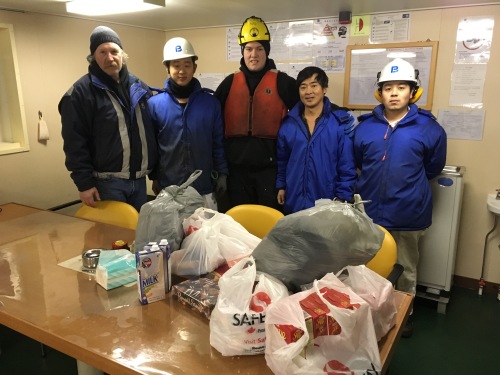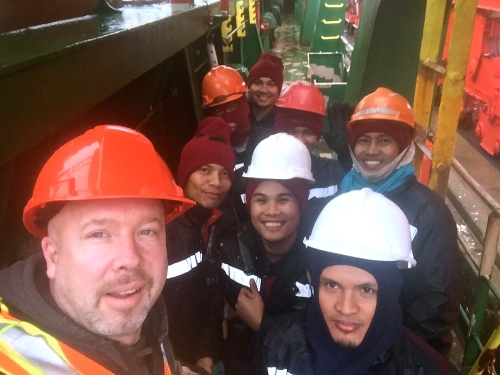
Ukrainian crew of the Orient Trader and longshoremen Jason Franklin (far left) and Dan Kask and Ian Neely (both at right) gather in solidarity at BC’s Fraser Surrey docks.
Solidarity is a wonderful thing. Solidarity plus an informed action plan is even better. In BC this week, the combination resulted in a moment that local longshoreman can be proud of: $33,166 US in unpaid wages returned to the Ukrainian workers who earned them. Eighteen new winter coveralls, 24 parkas, 10 winter hats and 36 pairs of winter boots delivered to crew shivering on deck without proper gear. Fourteen cases of fresh drinking water handed to crew who needed it. All paid for by the employer.
It happened because longshore workers, always determined to express solidarity with foreign seafarers in port, had been trained to express that solidarity in action. It happened because every day, the ILWU-Canada gives life to its motto: An injury to one is an injury to all.
In the final weeks before the holiday break, ITF Canadian Coordinator Peter Lahay and Oregon Inspector Martin Larson led a day-long seminar in Vancouver on the role and work of ITF inspectors. The idea was to explain what flag-of-convenience inspectors do and how they do it, to the longshore workers that are a critical part of our team effort. Turnout was enthusiastic: 25 International Longshore and Warehouse Union members who ranged from new workers to seasoned, experienced union reps.
The seminar stemmed from last year’s ILWU-Canada convention, when members approved a mandate for the ITF to train activists and build our network along the coast of BC.
It didn’t take long to translate enthusiasm into action. Seminar training took place Dec. 13. Five days later, longshoreman Jason Franklin was working on the Fraser Surrey docks when he noticed a Ukrainian seafarer shivering in the cold on the deck of the Orient Trader. The bulk carrier was alongside, discharging cargo. The man was ill-equipped to do his outdoor work. Franklin acted without thinking: he gave the seaman his own coat.
And then Franklin contacted Kal Uppal, business agent for Local 502. Uppal called Lahay. And Lahay — spotting an opportunity for the freshly trained local activists to use the skills they had learned — put out the call for longshoremen to investigate the onboard situation. Ian Neely and Gord Johnson, both from Local 502, were aboard within the hour. Neely kept the officers busy and eventually ended up in the captain’s office, interviewing him about apparent lack of cold-weather gear. Meantime, Johnson slipped away to talk with crew. They were nervous and, as he had been warned in the seminar, not initially forthcoming. Johnson offered them cigarettes to break the ice and encourage them to say what they could.
In the end, it didn’t matter that the crew were reluctant to speak and that the captain was quick to deny any problem. Neely and Johnson could see the situation with their own eyes: the vessel was not in good repair, the crew were poorly clothed and equipped, and seemed nervous and depressed.
“Ian and I noticed right away that the ship looked in disrepair,” says Johnson. “There was rust everywhere. We were surprised to learn the ship was only seven years old.
“The crew, their coveralls looked greasy but not that bad. But their coats were ranging from bad to awful. Some were fraying in places, others had come completely apart. One guy was wearing a new coat given to him by Jason Franklin, one of our guys. The seaman kept gesturing to it and repeating “Canada-man gave me this” when I was asking about his gear.
“I began passing out smokes and asking about their pay, sleep, food, everything I could think of. A small crowd formed as I offered smokes and asked questions. At first I was being told everything was fine, but their hesitation dissipated. One of them told me he hadn’t been sleeping because he’d been working 17 hour days trying to get the cranes going. They told me they were cold and they didn’t have any money. All their grievances came to the surface eventually. I could hear their frustration bubbling up.
“And everything they were telling me directly contradicted what the master had said.”
The longshoremen called Lahay to report their findings, which included excessive hours, poor working conditions, lack of personal protective gear, onboard salaries that were unpaid and overtime that was presumed to have been unpaid too.
Lahay approached the vessel’s owners with a list of the issues and a demand for action. The list included proper cold-weather gear, full payment of wages and overtime owing and a reminder about hours-of-rest requirements. The company agreed to act promptly, and even confessed that home allotments were still owing as well but would be paid. And it forwarded $33,166 US in unpaid wages for work done.
At one point in his exchange with representatives of the vessel’s operator, Lahay had noted that it would be appropriate for the company to acknowledge the solidarity between the crew and local dockers, who understand how difficult life is for seafarers and are alert to their hardships.
The company chose to respond appropriately. It agreed, in writing, that maritime workers should, and do, stick up for one another.
“We … acknowledge the solidarity between the dockers’ workforce and our crew. We appreciate your dockers’ full understanding of the seafarers life,” the owners’ rep wrote to Lahay. “We expect the Master on board to implement to the fullest our Company’s Health, Safety and Quality policy and to alert the Company of any requirements to ensure high standard of safety is at hand at all times.”
The lesson for local workers: that solidarity is as simple as seeing a fellow worker without warm gear and speaking up about it. And that having an informed action plan and a sense of how to proceed can really help.
“Peter’s seminar was a great introduction to the plight of the seafarer, and the roles and processes of an ITF inspector as part of the FOC campaign,” says Dan Kask, chair of the ITF’s young-dockers movement. “But more than that, it was a lesson on the power and the reach and the effect that unified ITF maritime workers, young and old, can have on the lives of seafarers.
“And what happened for the workers on the Orient Trader put that lesson into action.”
“The solidarity between dockers and seafarers goes back many, many years,” Neely adds. “It will continue long after we are all gone. We want seafarers to know that when they are in this port, we always have their backs.”
In the spirit of the season, let us repeat. This is what solidarity looks like: Delivery of 18 quilted winter coveralls, 24 quilted parkas, 10 winter hats, 36 pairs of winter boots — and 14 cases of fresh drinking water. $33,166 US in unpaid wages. Delivered via the power of a single worker who acted when he saw a seafarer in need — and the power of an international team of workers who acted with him. Who acted on their conviction that through solidarity, they will win dignity, safe workplaces and fair wages.
And this is how solidarity happens: ILWU members acted with the collective power and strength of their own union. Ukrainian crew observed the collective action and power. And ILWU members left them with advice as valuable as the new boots and coats: Join your national trade union. Participate in its activities. It is how we are best able to represent ourselves, and how we teach the next generation of seafarers they have the rights enshrined in the Maritime Labour Convention.
















